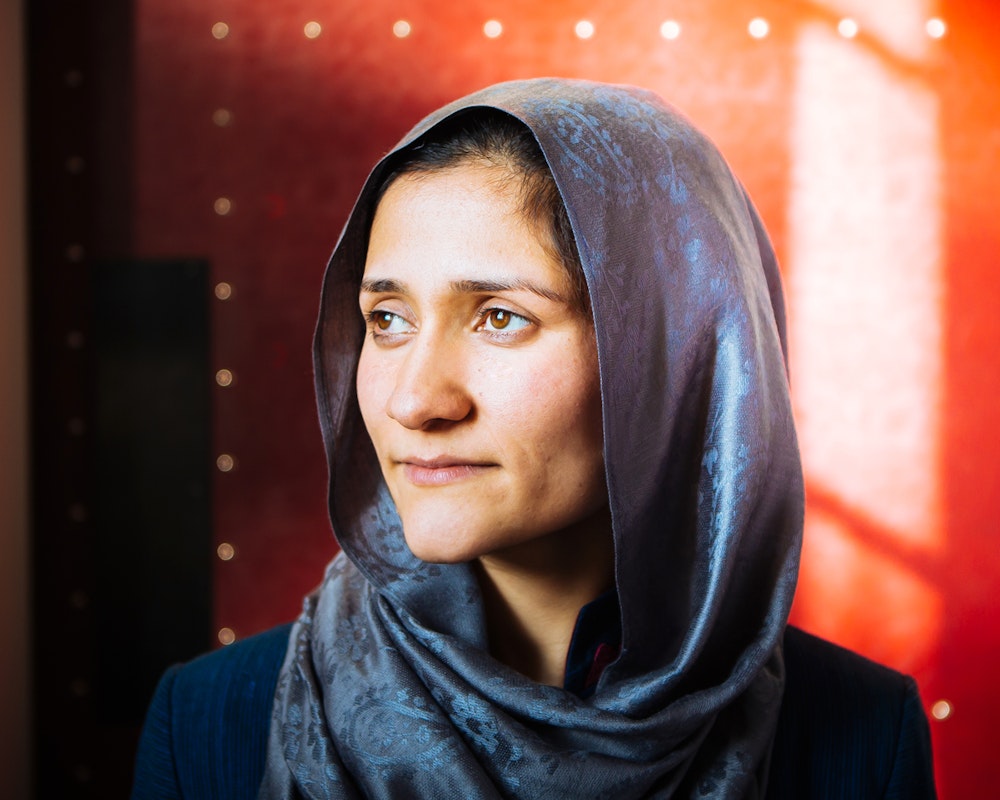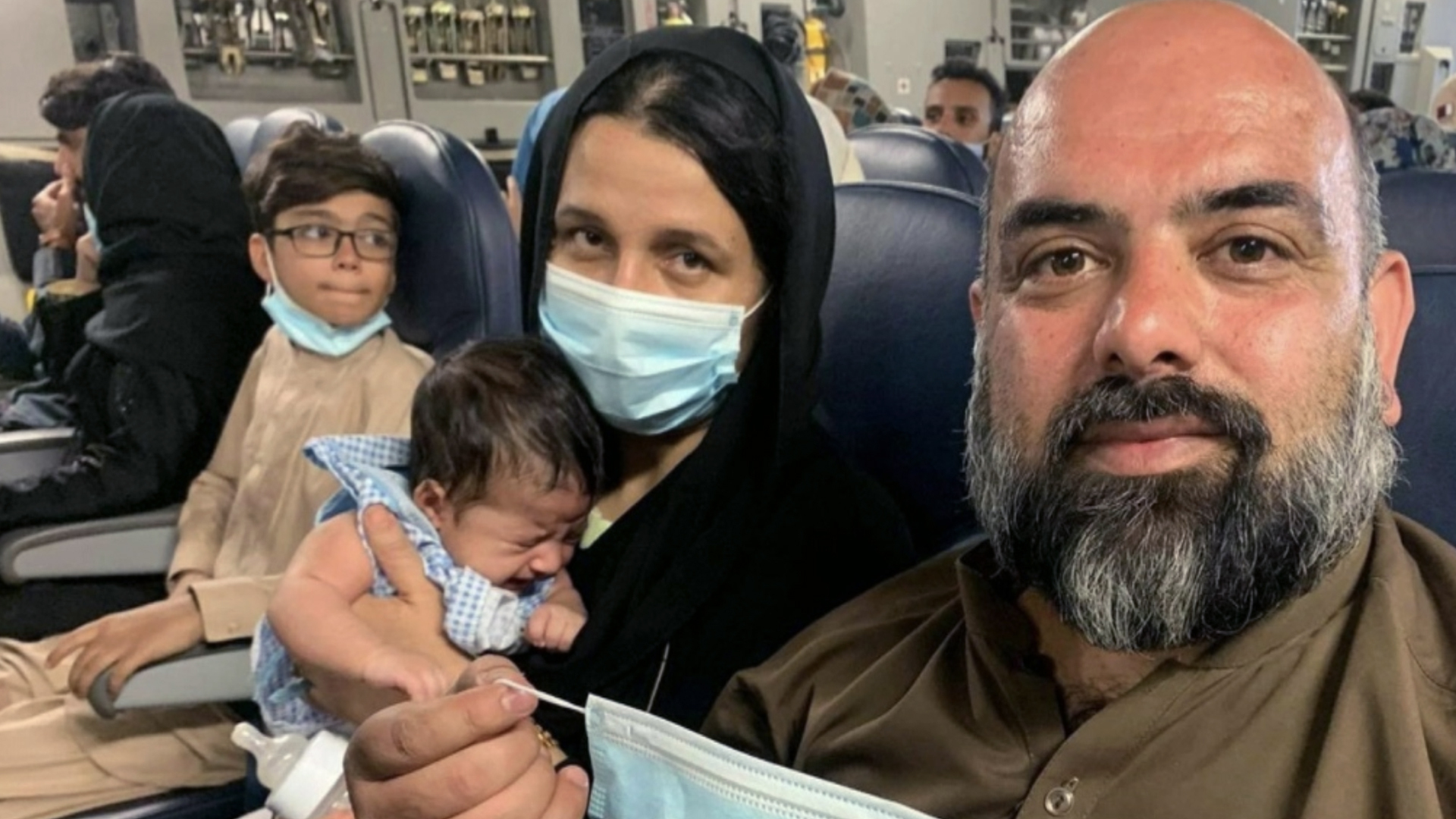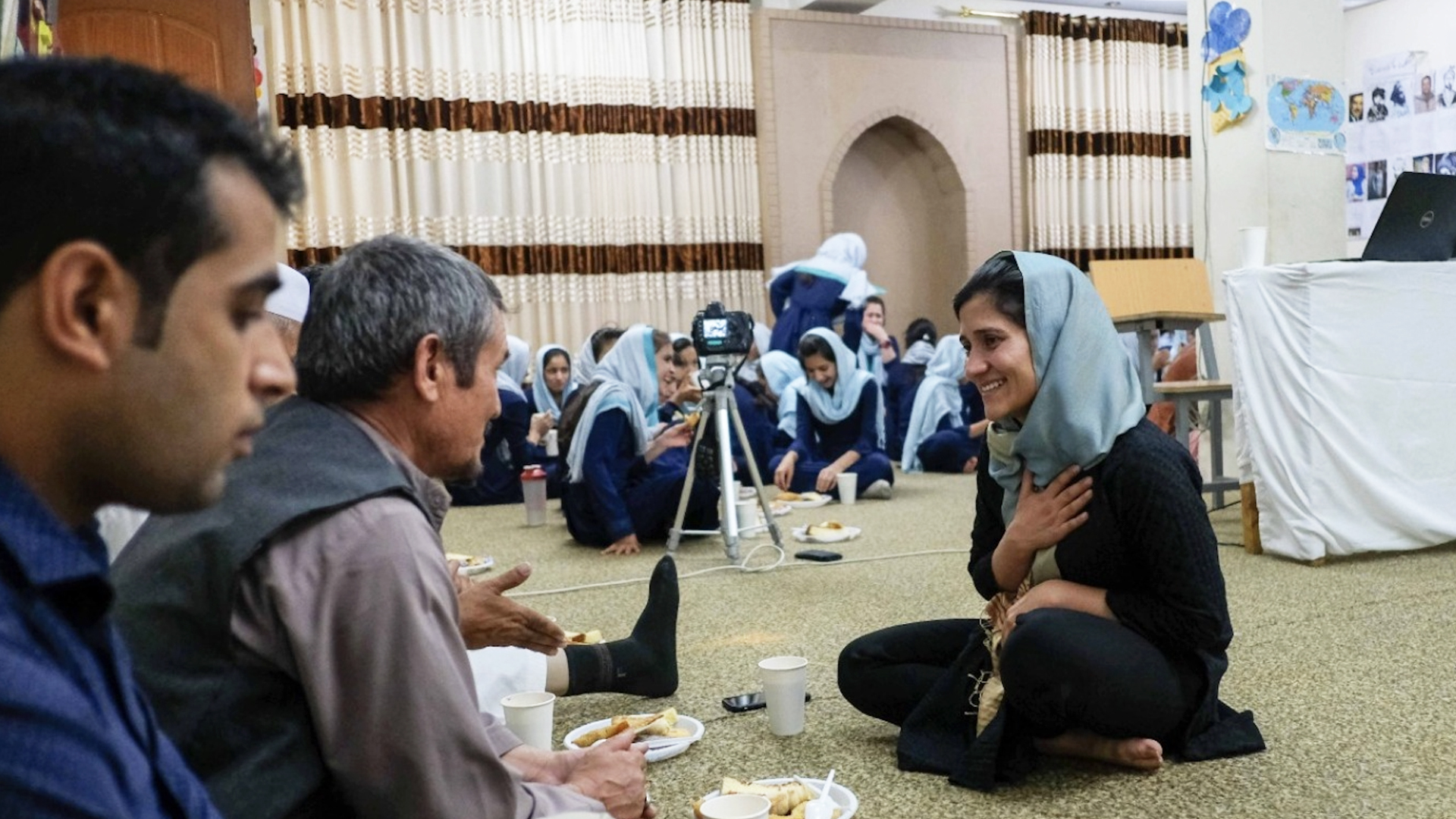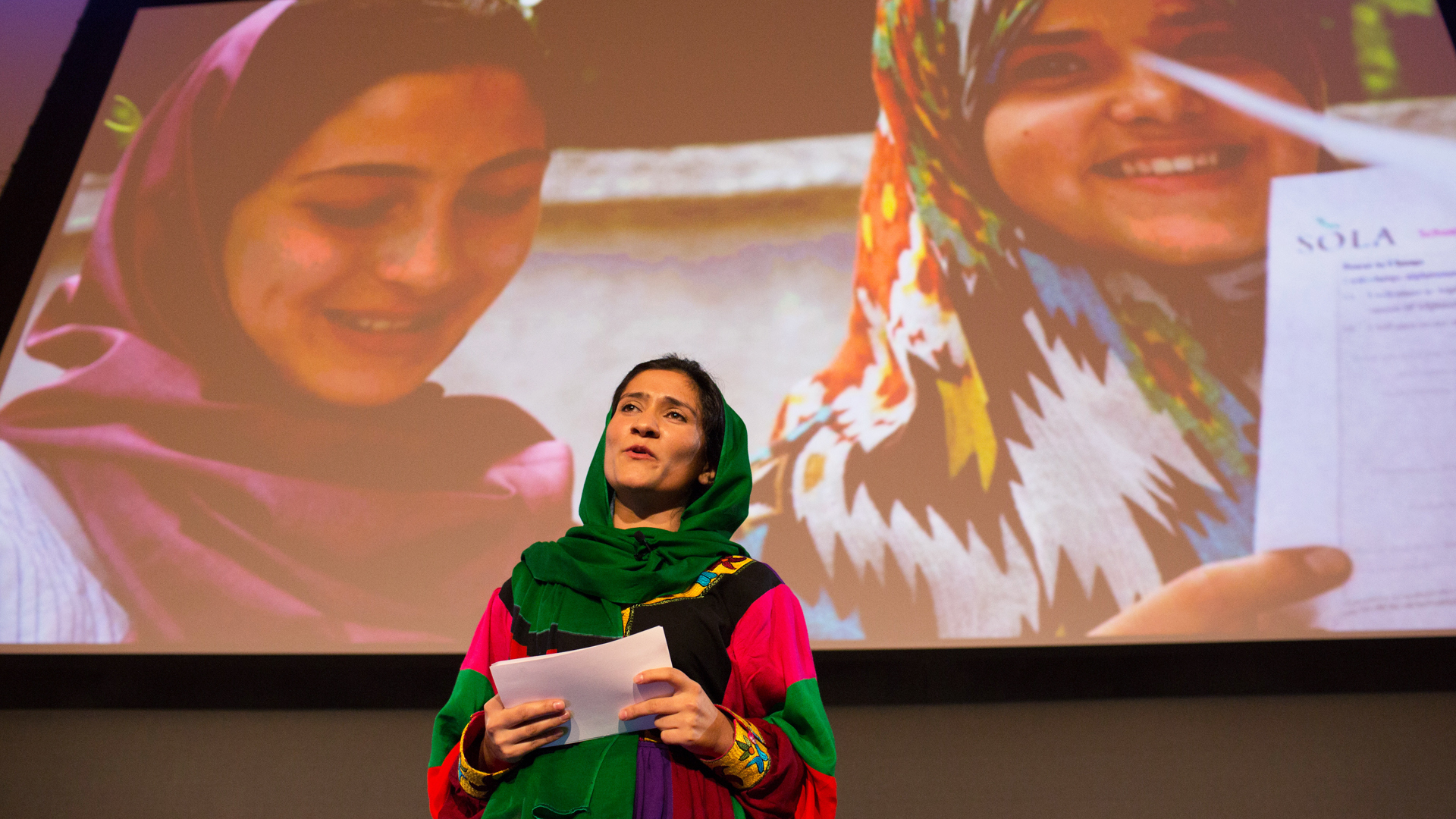
A Higher Calling
At its best, liberal learning produces courage
On August 12, 2021, the Taliban was sweeping through Afghanistan faster and more efficiently than anyone in the US government had anticipated. In institutions of higher learning throughout the United States, the events unfolding there were on people’s minds, but the realities of opening for classes during the COVID-19 pandemic presented more immediate challenges. One email from a faculty member, though, caught my eye: “I need your help with an alum who could be in danger in Kabul.”
Since he had graduated in 2010, Bilal Sarwary had become a distinguished news reporter in Afghanistan. Pro-democracy and committed to the freedom of the press, he was the journalist all the major networks turned to when they wanted the real story of what was happening on the ground in his country. In his openness to debate and support of transparency in government, Bilal was a walking public sphere, and he attributes this capacity to his college education. Given all the current conversations about the value of higher education, this might seem to some like an unexpected statement. But it is a highly meaningful one and has to do with the role of a liberal education in developing courage.
Higher education is at the crossroads and in the crosshairs of public life in the United States. Even though, according to several recent studies, the lifetime earning power of a college graduate still significantly outstrips that of a high school graduate by as much as $1.2 million, policymakers, and even some parents and students, worry that the return on investment in higher education is dwindling. Those on the political right assert that professors’ ideological biases are substituting for creativity and genuine exploration in teaching and research. Those on the left argue against the right’s weaponization of free speech arguments in the service of bigotry.
Lost in these controversies are the experiences of actual students like Bilal. Student transformations still happen all over the world—at large and small, rural and urban, public and private colleges and universities. Because they show real choices of students in profoundly challenging circumstances, these transformative stories compel us to think differently about the aims of higher education altogether. The stories of two young lives in particular—those of Bilal and Shabana Basij-Rasikh, from a war zone 6,500 miles away—are compelling cases for a liberal education’s role in building endurance, determination, and fortitude—key dispositions young adults need for facing overwhelming twenty-first-century challenges.
That August day in 2021 when I received the email about Bilal’s plight, I learned that very little could be done to help him. As a freelance journalist, he was on no one employer’s roster. He had no multinational media company to protect him. The nation he had tried to help rebuild was falling to pieces around him, and so he had no country, either. All he had were his own networks, including his Middlebury connections. The next morning, I received his details on Signal, an encrypted app for exchanging messages, and began a text conversation.
“How far are you from the airport?” I asked.
“About five minutes,” he said. “I just cannot get there. I am too well known, and they will recognize me or my name.”
Bilal had just been warned that he was on al-Qaeda’s assassination list. He did not want to mention it while messaging with me because his wife, two-month-old baby, mother, and father (who has Parkinson’s disease) were often in the room with him. Over the next three days, ABC News correspondent Ian Pannell, who was in Kabul covering the withdrawal from Afghanistan, and Bilal used their contacts with the Qatari government to get Bilal and other Afghans on the manifest of a convoy to the airport from the Kabul Serena Hotel, where Bilal had fled from his home.
On August 21, after several days of bureaucratic and political wrangling, Bilal and his family boarded a van in a convoy led by the Qatari ambassador and escorted by the Taliban, his protection coming from the moderate wing of the very group whose ideologies and forms of governance he was escaping. The text messages from Bilal were fast and furious.
“I’m boarding now.”
“Traveling down the first street.”
“Heading on the airport road.”
“At the gate.”
Later, from one of my colleagues who was also in contact with Bilal and his family: “The guards waved them through with no problem.”
Several hours later: “With Americans now.”
Finally: “Boarding the plane to Doha.”
Two weeks later, Bilal and his family landed in Toronto, Canada, with refugee status.

In the end, Bilal’s own connections with the international media and the Qatari ambassador made the difference in his escape. Middlebury provided two or three backup plans and placements on flight manifests should his initial plans fall through, and—important for everyone—hour-by-hour moral support.
As Bilal began his harrowing journey out of Afghanistan to Canada, another Middlebury graduate, Shabana Basij-Rasikh, from the class of 2011, was making her own escape out of Afghanistan with hundreds of other women. While still a student at Middlebury, Shabana started the School of Leadership, Afghanistan (SOLA), the first girls’ boarding school in her country. After she graduated, she returned to Afghanistan to focus on building SOLA. In the ensuing decade, she raised money, developed curriculum, and got the word out to interested families.
But in 2021, Shabana had to create an exit plan for the SOLA community. She constructed a phone tree for hundreds of women and girls so everyone could be reached within hours. She had to prevent the Taliban from discovering students’ home addresses to stop them from persecuting the girls and their families for their association with the school. At that moment, she had to use acid, not fire as she had previously, to destroy the school records. If the Taliban saw smoke from the burning records as they entered the city, they would target the building as suspicious.
On August 15, 2021, Shabana had to act. The Taliban were down the street, taking over buildings and businesses. She had one afternoon to get more than 240 women and girls—SOLA faculty, staff, and students and their family members—to the airport. Like Bilal, Shabana and the SOLA community made it out on Qatari and US military planes to Doha. In contrast to Bilal, though, with the visibility of his international reporting as a refugee in real time serving as a kind of protection—no one would be able to kill him in secret—Shabana was fleeing with hundreds of other women in conservative dress whose safety came from covering themselves.
Shabana and others from the SOLA continued on to Kigali, Rwanda. Shabana had already negotiated with the Rwandan government for the school to continue in the mode of a semester of study abroad in Kigali.
Shabana and I were also texting during SOLA’s harrowing last days in Kabul. She wrote to me:
“Very difficult times. Had to get our girls evacuated safely yesterday. I cannot share more yet.”
“I am working through the second group quietly—very quietly.”
“All of us are safe. I will share more soon.”
During their separate correspondence with me in those harrowing August weeks, both Bilal and Shabana told me that their liberal education gave them the courage to do what they did—report on democracy in the rural provinces, build a school for girls, even plan for their escape from the Taliban and continue their work in exile.
In a 2011 New Yorker essay, Louis Menand describes three historical aims of a college education: to be (1) a sorting mechanism for talent, and at times, prestige; (2) a place to explore ideas and purpose; and (3) a place to earn credentials to get a job. Menand accurately and eloquently portrays the ways most people think about the meaning and purpose of a college education. But what of Bilal’s and Shabana’s experiences? Do these descriptions about the aims of education make sense of their years after college, first working to build democracy in Afghanistan and then watching its failure? Or is there something more?
Both Bilal’s and Shabana’s journeys to a college education started in Kabul. In 1992, during the civil war in Afghanistan, Bilal was in second grade. After he lost his mother and sister in the shelling of the city, he and the rest of his family fled to the Nasir Bagh refugee camp in Peshawar, Pakistan. “One day I could watch cartoons in Kabul and go to school,” he told me in a conversation we had after he was settled in Toronto. “And the next, I was selling water in Peshawar and living in a refugee tent.” His schooling was marked by the politics of the time: “If you have five bullets and ten Russian soldiers, how many soldiers can you kill?” was one math question he vividly remembers.
At another refugee camp, he enrolled in English language courses. He painted houses and visited the American English Language Center and British Council between jobs. By the seventh grade, he was admitted to a school funded by Swiss nationals, jumping two classes. As Bilal approached high school age, he found a job with a transport company smuggling carpets and dried fruits into Pakistan. When he tired of being the target of Pakistani border control guns, he took a job as a watch salesman in a five-star hotel in Peshawar. There he came into direct contact with people with whom he could practice his English and converse about foreign affairs.
The turning point for Bilal was September 11, 2001, after which foreign journalists flooded the hotel where he worked. Someone offered him a job with Abu Dhabi TV, and he immediately took it, traveling back to Afghanistan as a translator without telling his family. In the ensuing years Bilal worked alternatively as a fixer, translator, and reporter for a variety of news agencies, including the BBC and ABC News.
Through all this exposure to Americans and Europeans, Bilal got the idea to go to an American college. In 2005, he applied to every college he could think of. Only a few accepted him. When Middlebury offered him full financial aid, he had no idea what or where it was.
Bilal was already in his early twenties when he arrived on campus, and even though he was a seasoned reporter, he still needed help on his papers. “Students helped me but told me they were not going to draft my papers for me,” he says. “I consulted with them on every apostrophe, every comma.”
One of the greatest shocks about classes at Middlebury for Bilal was the participatory ethos. He did not know what to say or how to respond in class. “I couldn’t understand that I was no longer in an educational system where there was just a fifty-minute exam at the end to prove myself,” he says. “Rather, I had to prove myself in every minute, every interaction.”
Eventually Bilal got used to the classes. He went to as many guest speaker events as possible and watched how people interacted. Over time, he was able to combine the savvy research of a reporter with the critical methods of a scholar. A class on the laws of war was a powerful example. He wrote an essay on drone warfare, using research from all his best journalistic sources in Pakistan and Afghanistan but going into depths of history and policy that journalists rarely have the time or airspace to do. Bilal also carried this interest into a geography class, where he learned how the differing terrains of Afghanistan helped the Taliban create warfare techniques.
Bilal also learned how to think comparatively. His senior thesis, written on his lifelong interest in the connections between drugs, warfare, and terrorism, compared the Taliban in Afghanistan and FARC in Colombia (Fuerzas Armadas Revolucionarias de Colombia, or Revolutionary Armed Forces of Colombia). From that project, he was able later in his career to draw on his knowledge and experience to investigate Lebanon and Turkey.
Over the course of his time at college, Bilal grew from a savvy reporter to a cosmopolitan thinker. “Now I was a worldly guy, not just some guy,” he says. “I had friends all over the world.” He also overcame his antisemitism. “In 1999 Peshawar, I hated all Jews,” he says. “Now I had, and actively cultivated, Jewish connections all over the world.” He also overcame his antipathy to the Pakistani elite: “I used to argue with my Pakistani friends in class all the time. They were from the upper echelons. But we became true friends as a result.”
When he returned to Afghanistan, Bilal continued to work for news outlets, including Al-Jazeera and the BBC, interviewing members of the Taliban in the extremist and moderate provinces. He even ran (unsuccessfully) for a Democratic seat in an al-Qaeda dominated province.
In Canada, Bilal still writes and tweets about Afghanistan under Taliban rule: changes in provincial governments, the execution of leaders he knew and worked with, signs of hope that Taliban rule may not last. “I’ve worked with one goal and one passion,” he says, “to make sure the 1990s are not repeated in Afghanistan.”
Shabana’s childhood in Afghanistan was equally shaped by the Taliban regime of the 1990s. She grew up in the educated classes of Kabul, with a father in the military and a mother who pursued an undergraduate education while working as a schoolteacher.
Shabana wanted to be a general like her father. “I was told that women cannot be generals, and I would not have those opportunities under the Taliban,” she says. “The most ambitious thing you could be was a doctor—you are the top student, and you are going to have that future.” Attending college in the United States would help her achieve the highest profession for a woman in Afghanistan.
When Shabana arrived at Middlebury, she was amazed that students’ majors were not chosen for them. She also realized her broader education and knowledge had significant gaps. “I couldn’t understand most of the references other students made in class,” she says. “But it was the first time I was invited to look at something beyond being a doctor.” Shabana became fascinated by a class on the sociology of gender and made friends in the town—American women in their sixties and seventies—conversing with them about their experiences working for women’s rights.
“Because of the parallels between America and Afghanistan, I was keen on drawing lessons,” Shabana says. “Where is the key here that can unlock a much faster acceleration of success for women in Afghanistan?”
It is no coincidence, she says, that “with SOLA that I have had an emphasis on building a network of sisterhood across grades and across as many different backgrounds across Afghanistan. If women could feel safe together . . . .”
After graduating, Shabana returned to Afghanistan, dismissing many well-meaning suggestions that she stay in the United States and use her education to pursue a career path that would be more lucrative and less dangerous.
In the mid-2000s, no boarding schools for girls existed in Afghanistan. Shabana’s goal was simple: to recruit girls from across Afghanistan and give them an education that would prepare them to study at university and live productive lives in a democracy. As she recruited for SOLA, Shabana did not encounter reticence but a passion and willingness in all parts of Afghanistan to educate girls.
SOLA’s medium of instruction was English, but classes were also held in Pashto and Dari, the official languages of Afghanistan. Shabana took inspiration from her Middlebury education when creating SOLA’s curriculum to focus on the development of skills needed for university, such as critical thinking, knowledge of history, quantitative skills, and social studies and cultural expertise. She and her staff also emphasized personal capacity-building, empowering girls to make decisions, deepen their own agency, and thrive even in adverse circumstances.
Women’s empowerment was always discussed from a specifically Afghan perspective. Student government was patterned after the jirga, a deliberative council unique to Afghanistan and used at all levels, from the village to the national government. The study of Islam was incorporated into the curriculum as integrated with other subjects that the students were studying. The history of Afghanistan and women’s contributions to it were a central focus.
Before the summer of 2021 SOLA housed nearly one hundred students from almost every province in the country. “In SOLA,” Shabana says, “we had built the strongest and most comprehensive network of sisterhood across Afghanistan.”
Now in exile in Rwanda, Shabana is determined to keep alive that sense of connection among Afghan women. She recruits Afghan girls from refugee camps all over the world to attend SOLA. She and the SOLA staff stationed in Rwanda have also used their multiple connections in Europe, Africa, and America to make sure that the girls and women who escaped have placements either in Rwanda or elsewhere in high schools around the world.

Bilal’s and Shabana’s decisions to return to Afghanistan were not naïve but complex enough to last through hardship and challenge. Primarily, they possessed a hard-won sense of self that could not be shaken by how others perceived them or their work. “Before college, from morning to evening,” Bilal says, “I would be five to six different people. And after college, I was just myself.”
Neither Bilal nor Shabana returned to their country with the ideal of imposing US models of government or education. They were aware of the deep challenges and contradictions of the US occupation. Rather, both were motivated to build upon the fundamental strengths of Afghanistan’s traditions—the strength of its teachers, its villages, its diversity, its women, its forms of debate, and its local governance. They collaborated with people across the gamut of Afghan’s politics, society, and religion. They knew elites and villagers. They knew religious Muslims and secular leaders. They knew Americans and Europeans. In their 2021 escapes, both Bilal and Shabana were well served by their far-reaching connections.
It is unclear whether either of them will ever be able to return to Afghanistan at all, much less return to the kind of Afghan society they were trying to build. But they have the imagination and the historical view to continue to build it outside the country.

After they had both reached relative safety, I kept pondering the questions of what college had given Bilal and Shabana and what we could learn from their educational journeys. I looked at Bilal’s and Shabana’s transcripts—imperfect records of two undergraduate careers. Bilal had done an independent major, focused on the relationship between the drug trade, terrorism, and war in South Asia, with a minor in Arabic. Shabana had pursued a double major in international studies and anthropology/sociology, with a minor in women and gender studies. Both had focused sharply on the issues of their region: international politics, the study of Islam, women in South Asia, global politics, and weapons of mass destruction.
Their early transcripts are not stellar. What mattered, though, was that the fundamental questions those first courses raised for both students remained meaningful to them. With Bilal and Shabana in mind, I now often tell students who are having difficulty in a course: “Your struggle matters. This could be the subject where you go on to be a globally renowned expert.”
Their stories show that these aspects of a liberal education create a capacity for inquiry—a fragile but life-changing persistence of mind that is impossible to measure and impossible to extinguish. “Liberal learning allows you to be intrigued by problems,” Shabana says.
The story of the birth of Bilal’s and Shabana’s life dreams in college and the violent loss of those same dreams only ten years later teaches us something: at its best, liberal learning produces courage. Their journalistic and educational work was destroyed in a week, but both had the personal, intellectual, and moral resources to persevere in extraordinary circumstances.
In college, Bilal and Shabana learned to explore, argue, and then choose—do one thing as their meaningful work among myriad other choices. This kind of choice is no mean feat and is not for the faint of heart, as journalist Oliver Burkeman notes; you must pick a fight with the world to focus meaningfully on a few things. I have come to understand this singleness of purpose in the face of overwhelming odds as twenty-first-century courage.
“I did feel scared when assassinations were individualized,” Shabana says. “Do you stop the things that you are doing when those very things put you in the category to be assassinated? For me, giving up would have felt worse than death. Giving up would have meant another kind of death—an undignified death where I still had to keep on living.”
Bilal’s and Shabana’s stories add something powerful to the chaotic debate about higher education and the dangerous withdrawal of our commitment to liberal learning. The worth of a college education is spectacularly evident in these two extraordinary young lives, but that value can also be applied more widely, in less dramatic circumstances. I have watched Bilal and Shabana give workshops and interviews to college students, and when they speak, the room is silent. People listen intently because it is clear Shabana’s and Bilal’s lives of international purpose were built from ordinary conversations, experiences, and decisions driven by a simple eagerness to know. Their accounts of college tell of the global impact that a liberal education can make and of institutions and rigors that, for all their flaws, still foundationally change the human experience. This exchange of ideas and expansion of minds still happens all the time, in classrooms everywhere—at state universities, community colleges, and everything in between.
Shabana’s and Bilal’s stories are just two experiences of two people. Yet they reveal a courage of imagination born of a twenty-first-century liberal education’s power to build a new version of a democratic and free world.
Lead photograph: Shabana Basij-Rasikh started Afghanistan’s first girls’ boarding school. (Courtesy of Joanna Chattman via Williston Northhampton School)